

Aspergers. Inside and Out: A Few Words about Empathy. By Nicole Nicholson on August 17th, 2011 Got empathy?
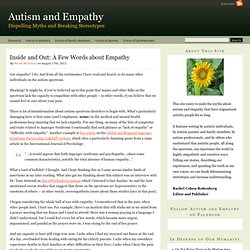
I do. And from all the testimonies I have read and heard, so do many other individuals on the autism spectrum. Shocking? It might be, if you’ve believed up to this point that Aspies and other folks on the spectrum lack the capacity to empathize with other people – in other words, if you believe that we cannot feel or care about your pain. There is lot of misinformation about autism spectrum disorders to begin with. . “ …it would appear that both Asperger syndrome and psychopathy…share some common characteristics, notably the total absence of human empathy…” What a load of bullshit! I began considering the whole ball of wax with empathy. And my capacity to hurt still rings true now. And it doesn’t seem to matter whether I know the people personally or not. I’ll go even a bit further: I have trouble sometimes watching TV shows or movies that are emotionally evocative.
Teaching Students with Aspergers Syndrome: Tips for Teachers and Parents. Students with asperger's syndrome may experience difficulties with focusing as well as lack of focus.
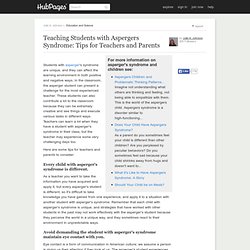
Focus involves attention. Sometimes asperger's students focus all their attention on a particular object or subject; therefore, they fail to focus on what information the instructor is presenting. All their energy is directed toward a particular subject or object. Why? Because that object or subject is not overwhelming to them and they understand it. To overcome this problem, the teacher can try to establish some connection between the object or subject of interest and the area of study.
The possibilities for instruction are endless, but it will take some time and creative planning on the part of the teacher. Sensory issues affect learning for the student with asperger's syndrome. Often aperger's students are distracted by something in the environment that they simply cannot control. Obviously, a teacher does not want disruptions in the classroom. Teaching Aspergers Children: Tips For Teachers. Educators can be great allies in keeping your youngster with Aspergers (AS) or High-Functioning Autism safe and successful in school, but you'll need to make sure they have all the knowledge they need to help.

Use the suggestions below to create an information packet to bring educators up to speed... The Five Main Things Educators Need to Know— 1. If there will be any sort of change in my youngster's classroom or routine, please notify me as far in advance as possible so that we can all work together in preparing her for it. 2. 3. 4. 5. General Behaviors— · At times, our youngster may experience "meltdowns" when nothing may help behavior.
. · Foster a classroom atmosphere that supports the acceptance of differences and diversity. · Generally speaking an adult speaking in a calm voice will reap many benefits. Homework. Children with Asperger's Syndrome: Characteristics/Learning Styles and Intervention Strategies pg 2. Language Comprehension/Auditory Processing Difficulties Characteristics: Children with Asperger's Syndrome generally interpret auditory information literally and concretely.
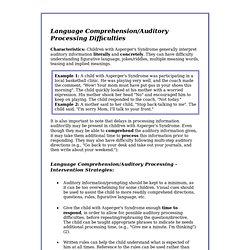
They can have difficulty understanding figurative language, jokes/riddles, multiple meaning words, teasing and implied meanings. Example 1: A child with Asperger's Syndrome was participating in a local basketball clinic. He was playing very well, and the coach made the comment, "Wow! Your mom must have put gas in your shoes this morning". Guidelines for teaching students with Asperger syndrome in further education colleges. As well as behaviour, the areas of impairment will affect the thought processes that govern behavioural responses to the environment and responses to the demands made by people, and situations arising within this space.
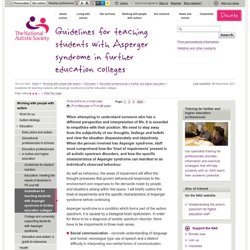
I will briefly outline the triad of impairments and the specific characteristics of Asperger syndrome before continuing. Asperger syndrome is a condition which forms part of the autism spectrum, it is caused by a biological brain dysfunction. In order for there to be a diagnosis of autistic spectrum disorder, there have to be impairments in three main areas: - concrete understanding of language and formal, monologue type use of speech and a distinct difficulty in interpreting non-verbal forms of communication. - difficulty in relating on a social level to others, inability to read the thoughts and feelings of others; forming relationships is a problem area. What is Asperger syndrome? Here we explain more about Asperger syndrome - a form of autism - including the three main difficulties that people with Asperger syndrome share, how many people have the condition, and what may cause it.
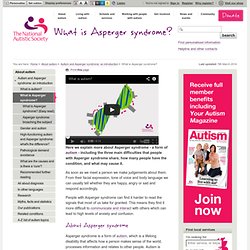
As soon as we meet a person we make judgements about them. From their facial expression, tone of voice and body language we can usually tell whether they are happy, angry or sad and respond accordingly. People with Asperger syndrome can find it harder to read the signals that most of us take for granted. This means they find it more difficult to communicate and interact with others which can lead to high levels of anxiety and confusion.
About Asperger syndrome Asperger syndrome is a form of autism, which is a lifelong disability that affects how a person makes sense of the world, processes information and relates to other people. Asperger syndrome is mostly a 'hidden disability'. Social communication social interaction social imagination. Asperger syndrome: the triad of impairments.